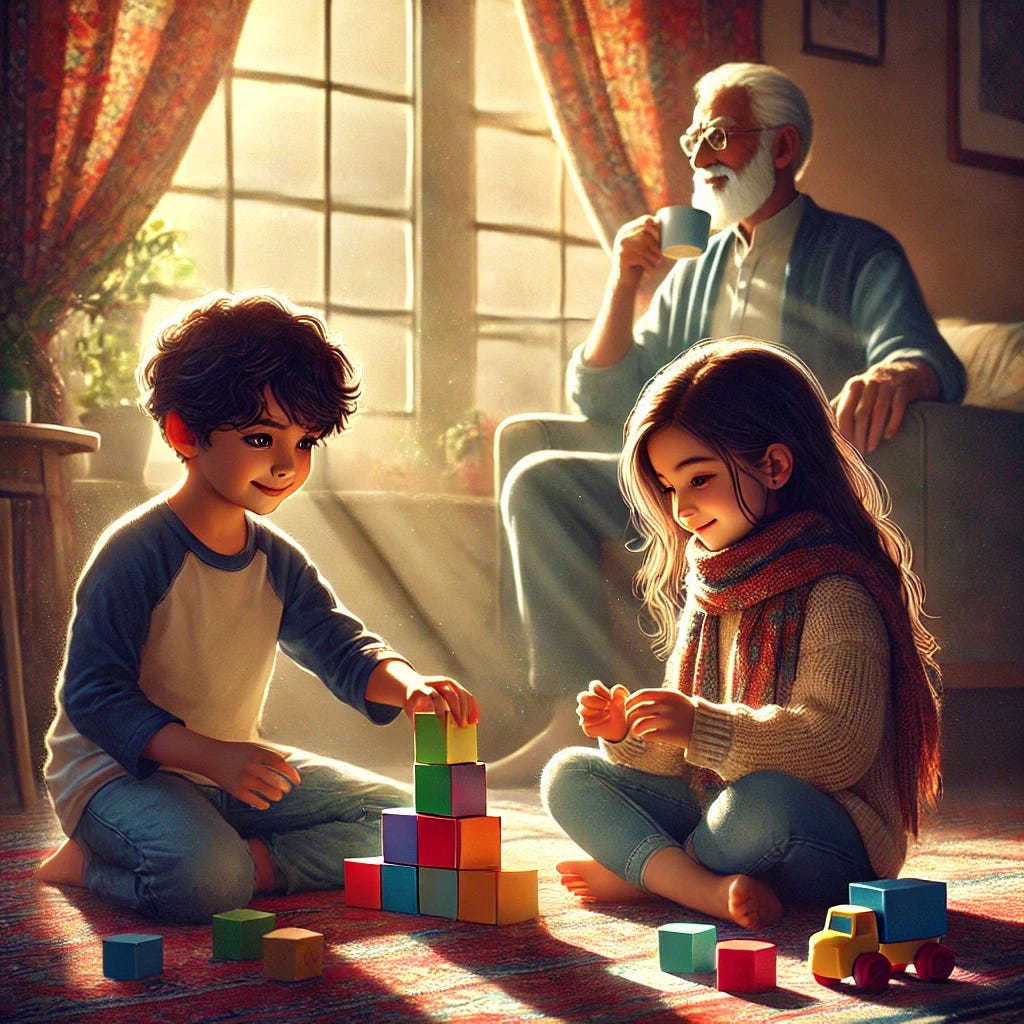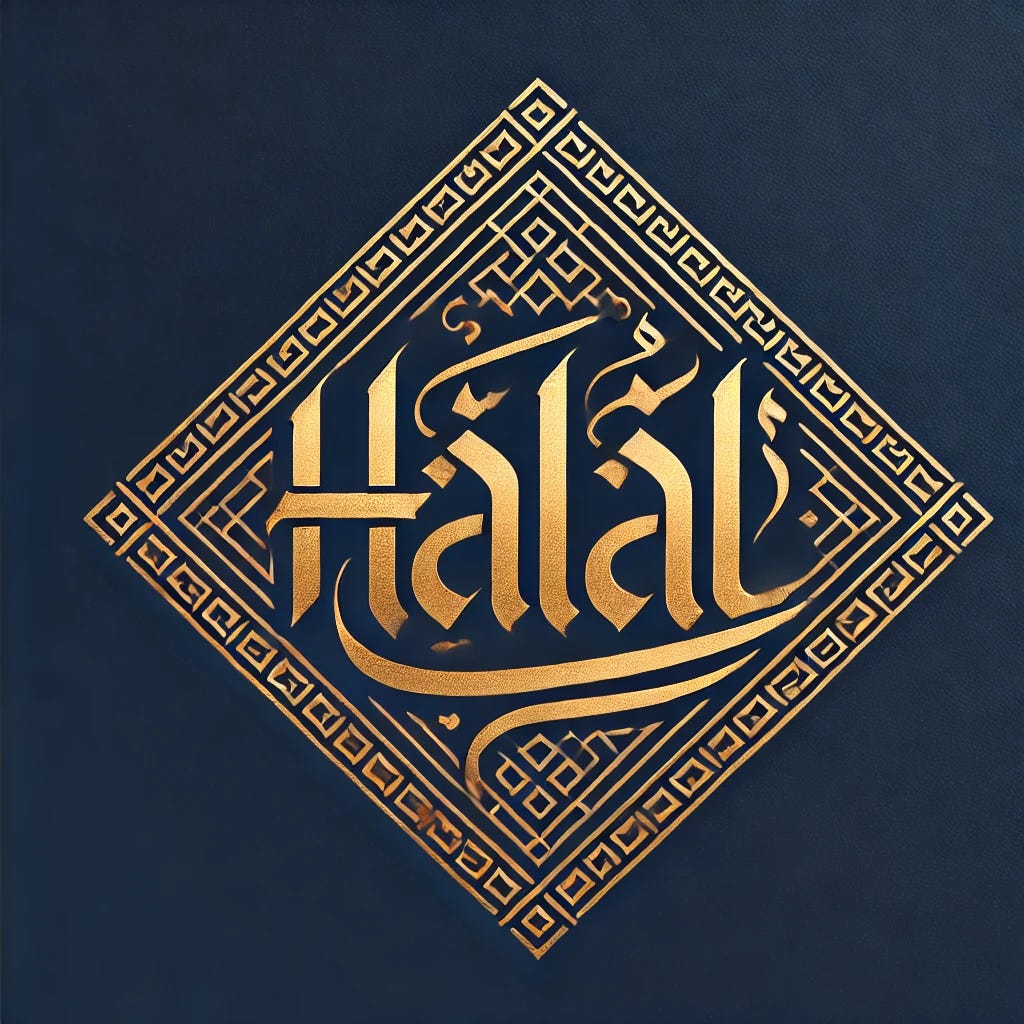It was a peaceful Sunday afternoon. Sunlight streamed through the curtains as Zayn and Sara sat cross-legged on the floor, sorting their toy blocks.
Grandfather Ahmed sat nearby, sipping his warm tea, watching them with a smile. He loved these little moments with his grandchildren.
“Grandpa,” Zayn suddenly said, looking up, “today at the store, I saw a huge chocolate bar! But Sara said we should check if it’s halal first.”
Sara nodded. “I told him we can only eat halal things, but I don’t know why. And what about other things? Like, is everything either halal or haram?”
Grandfather Ahmed chuckled. He leaned on his wooden stick and motioned for the kids to come closer.
“Ah, my little adventurers, you have asked a question more valuable than gold! Do you want to know a secret?”
The kids' eyes sparkled with curiosity. “Yes, Grandpa!”
The Secret of Halal and Haram
Grandfather Ahmed smiled. “The secret is this: Halal is a treasure! It’s like a key that unlocks Allah’s blessings and happiness. And haram? That is like a locked door we should never open, because behind it is harm.”
Zayn tilted his head. “So… halal is good for us, and haram is bad?”
“Exactly!” Grandfather nodded. “Allah, the Most Merciful, only tells us to stay away from things that can harm our body, heart, or soul.”
What is Halal and Haram?
Grandfather Ahmed gently tapped his stick on the floor. “Allah tells us in the Quran:
‘O you who have believed, eat from the good things which We have provided for you and be grateful to Allah.’ (Surah Al-Baqarah 2:172)
“This means we should only eat what is pure and good—that’s halal food! And Allah also tells us:
‘He has forbidden to you dead animals, blood, the flesh of swine, and that which has been dedicated to other than Allah.’ (Surah Al-Ma'idah 5:3)
“That means haram foods are things like pork, animals that were not slaughtered the right way, and food made with haram ingredients.”
Sara’s mouth formed an ‘O.’ “So that’s why we check if food is halal before eating!”
Grandfather Ahmed nodded. “Yes! It’s just like a treasure map. Allah has marked the right path for us to follow so we stay safe and healthy.”
Is Halal Just About Food?
Zayn scratched his head. “But Grandpa, is halal only about what we eat?”
Grandfather Ahmed smiled. “Aha! That’s a great question, my boy. Halal is not just about food—it’s about everything in life!”
He counted on his fingers. “There are four important things that should always be halal:
What we eat and drink – We make sure our food is halal and pure.
How we earn money – We should earn honestly and avoid things like stealing or cheating.
The way we speak – We should say kind words and avoid lying or bad words.
Our actions – We should do what pleases Allah, like helping others and praying.”
Sara’s face lit up. “So being a good Muslim means choosing halal in everything, not just food?”
Grandfather Ahmed beamed with pride. “Yes, my dear! When we follow what is halal, our hearts feel peaceful because we are doing what Allah loves.”
Why Does Allah Forbid Haram?
Zayn frowned. “But, Grandpa, if Allah loves us, why did He even create haram things?”
Grandfather Ahmed stroked his beard thoughtfully. “Ah, Zayn, let me ask you something. If you see a fire burning, will you put your hand in it?”
Zayn shook his head. “No way! That would hurt.”
“Exactly,” Grandfather said. “Haram is like a fire—it looks harmless, but if we go near it, we can get burned. Allah forbids haram things to protect us, just like parents tell their children not to touch something dangerous.”
Sara’s face lit up. “So, Allah tells us to stay away from haram because He cares about us!”
Grandfather smiled. “That’s right, Sara! Everything Allah tells us is for our own good.”
A Fun Challenge
Grandfather Ahmed tapped his stick on the floor again. “Now, I have a challenge for you both!”
Zayn and Sara sat up excitedly.
“For the next three days, I want you both to look around and find at least five halal things and one haram thing in everyday life. Then, come back and tell me what you found.”
Zayn grinned. “That sounds fun! I already know one haram thing—lying!”
Sara giggled. “And I know a halal thing—sharing my toys!”
Grandfather laughed heartily. “MashaAllah, you are both learning so fast! Now go, my little detectives, and find the treasures of halal!”
The children jumped up, excited for their new challenge, while Grandfather Ahmed leaned back in his chair, thanking Allah for blessing him with such eager learners.
In today's fast-paced world, where children are constantly exposed to various influences, it is more important than ever to teach them the concepts of Halal and Haram in a way that resonates with their young minds.
Rather than enforcing rules rigidly, storytelling offers a natural and engaging way to help them internalize these values. When children like Zayn and Sara listen to their grandfather’s stories, filled with warmth, wisdom, and relatable lessons, they enjoy the moment and absorb lifelong principles effortlessly.
Through interactive and meaningful storytelling, we can nurture their understanding of right and wrong in a way that feels exciting, relevant, and memorable—ensuring that Islamic values stay with them as they grow.





